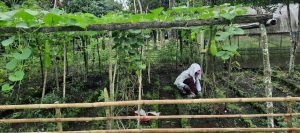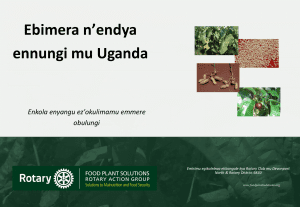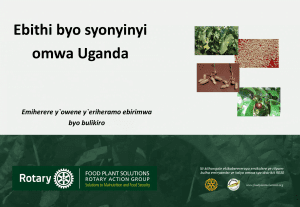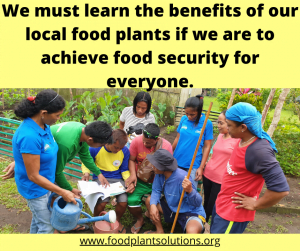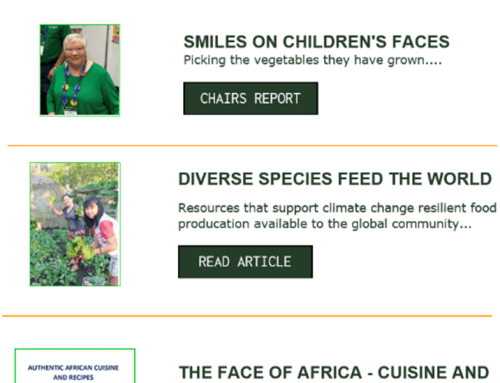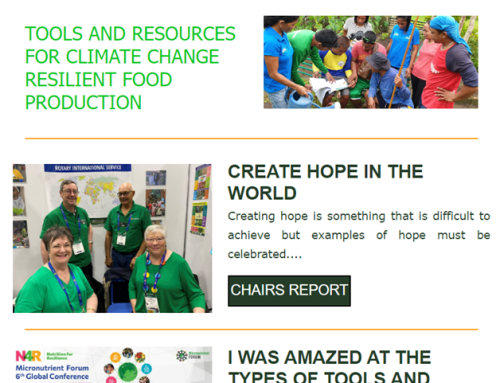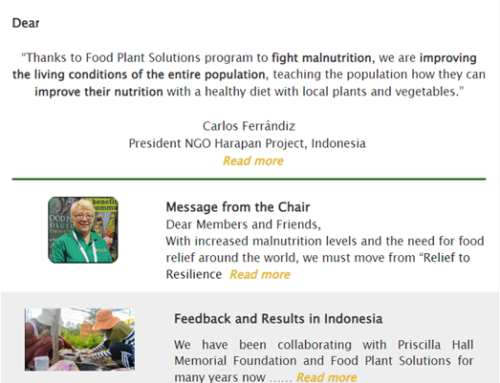Learn more about how our approach provides a sustainable source of nutrition, as various program partners provide feedback on their partnerships with us.
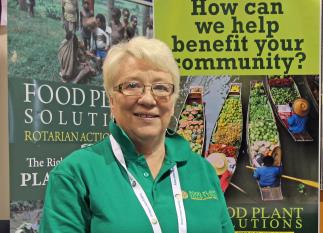
Message from the Chair
Happy New year to you all!
I am writing this as I listen to the speeches of the Australians of the year, and think about how much we have – food, safety and security, a good health service, education for our children. At the same time, I know there are many people who tonight have no food for their families and do not live in a secure situation. That is why I work for the end of malnutrition in the world. I know it can be achieved. We are making strides bit by bit. Our annual reports from services we have assisted this last year have shown that change can happen.
At the end of last year, in my Message from the Chair, I talked about the effect that Covid was having in many communities in our country and around the world. So many projects are wanting support, and I understand that all clubs are having difficulty keeping up with demands on their funds. We all, as Rotary Action Groups, are here to support clubs to value add to their projects in many countries, so that we are all providing the best value we can for funds donated to us.
Since 2007 we have had many requests, from NGO’s or community groups, in countries who are in great need of food, just to survive. Because of this, we have prepared educational materials for these countries, and have placed them on the website. They still need a financial supporter and to be reviewed in-country. Please consider these as you start thinking about what projects you would like to support or are already supporting in other ways.
Each of you can assist by joining Food Plant Solutions Rotary Action Group personally, or asking your club to join, for either $30 per year, per person or $100 per club, per year. What a difference it would make to children in the world to not only grow food but be confident in the security of the food source; for parents to know their families will survive because they understand how to grow and cook sustainable, nutritious food. https://foodplantsolutions.org/get-involved-and-join-us/
For very little a year, you can join me in adding to those funds, to make sure our vision of a world where malnutrition no longer exists is real.
I know, as We Serve to Change Lives, you will continue to make a difference to the lives of others.
Thank you for all you do
Yours in Rotary
PDG Una Hobday OAM, PHF
Chair – Food Plant Solutions Rotary Action Group
Ugandan Materials Translated
Due to the dedication of several volunteers, all four of our Ugandan Picture Guides have been translated into both Lhukonzo and Lugandan. These are now available in print-ready format, free of charge on our website – https://foodplantsolutions.org/programs/uganda/
Our sincere thanks to the dedicated volunteers that made this happen.
Why Donate?
A donation to Food Plant Solutions Rotary Action Group is more than just money, it’s hope for millions of children and their families. https://foodplantsolutions.org/donate/
Program Countries
We are pleased to advise that we now have educational resources for 52 countries! Each of them can be accessed from our website – https://foodplantsolutions.org/programs/
If the material we have isn’t in the layout you require, we are happy to work with you to present the information in a way that suits your needs. And, if your country of interest isn’t listed, please contact us so that we can commence discussions on how we can collaborate. E:info@foodplantsolutions.org
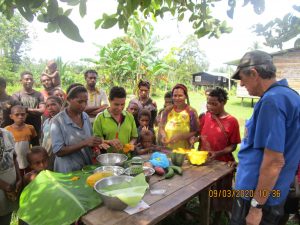
Papua New Guinea – Alleviating Malnutrition
In October 2018, Dr Russ Stephenson commenced a three-year project made possible with a Rotary Global Grant, in the Strickland Bosavi area, (Western Province) of PNG. An impoverished area, of 184 villages, where an estimated 54% of children are stunted and 14% wasted.
The project was based on the Food Plant Solutions Rotary Action Group philosophy of encouraging consumption of nutritious local foods, rather than introduced new foods or supplements to overcome malnutrition, (making it sustainable). The aim was to improve the nutrition of babies, children under five years old and mothers, reducing infant mortality, morbidity and child malnutrition.
An initial Train the Trainer workshop was held with 55 volunteers from 19 villages. Upon completion the volunteers formed 15 teams of instructors who undertook to teach nutrition workshops in their own, and surrounding villages. These 15 teams of instructors then delivered awareness / information sessions (in ples tok) on improved nutrition, birth control, immunisation, disease treatment, and Water, Sanitation and Hygiene (WASH). These workshops empowered women, which will lead to better nutrition, and ultimately improved physical and cognitive development of their children. Outcomes achieved to date:
- 41 village workshops, attended by 8,369 participants (>25% of the population), representing about 2,030 families.
- Demonstration village home gardens established in 9 villages.
- Talks were given at 6 village schools to teach students about the importance of good nutrition for their development.
- Supplementary seed of nutritious corn, beans, peanuts and coconut were distributed to each household to increase production of nutritious food.
- Reference booklets “Nutritious Food for Stronger Child Growth in Papua New Guinea” and “Notes on Growing More Nutritious Food in Your Garden” were compiled and distributed to each household. Primary School nutrition books were provided to eight schools. A manual for preparation of nutritious baby food was published in English and Biami.
- Nineteen 15-minute programs of project lessons were broadcast on Radio Biami, in both English and the Bedamuni (Biami) language.
- 2 workshops were held for village women on preparation of locally available, nutritious baby foods, which saw babies enthusiastically consume the food their mothers prepared.
Due to the success, but also the need, plans have been developed to extend and expand this project. This will only occur with additional funding, which is yet to be achieved. A full report is available on this project, please contact us for more details. E:info@foodplantsolutions.org



Community Gardens in the Philippines
Recently our program partner in the Philippines – The Muravah Foundation answered some questions about the community gardens they have created, based on the Food Plant Solutions philosophy.
How many gardens are operating?
- Currently, there are two gardens operating. The first one is located near Muravah Foundation Office, Barangay Sua, Camalig, Albay and the second one is in the Muravah Farm situated at the foot of Mayon Volcano, Barangay Sua, Camalig, Albay Province.
Who manages them?
- The gardens are being managed by Ronel Moyo. He is one of the employees of Muravah Foundation. He is assisted by two of our other workers – Evelyn Sacayan and Devinia Napiri in the maintenance of the gardens.
Are people in the community growing their own gardens?
- We have distributed seedlings last year but due to Covid Pandemic we were not able to monitor their gardens from that time due to lockdowns and strict protocols in roaming around.
What plants are you growing?
- We have planted strings beans, squash, corn, bottle gourd, winged bean, chili, tomato, bell pepper, eggplant, cucumber, bitter gourd, okra (ladies’ fingers), baguio beans and pechay (Chinese cabbage).
How is the produce being used?
- The harvested crops are being distributed to the families in three barangays namely Sua, Quirangay and Iluluan. We have identified the families who are in most need of help with food supply.
What are the benefits of the gardens?
- The vegetable gardens help the families in the community in a great way because they have their source of healthy food to eat. They are encouraged to eat more healthily with these organic vegetables. Plus, it saves them money.
